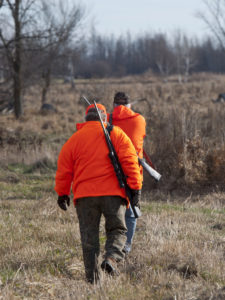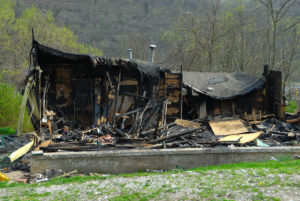Bubba came to the office last week without an appointment. He was hotter than a firecracker on the 4th of July. He was ranting about wanting to sue his insurance company for “bad fate” and that I could have all of the money from the lawsuit. He said I could put it all in that fancy bank where all the rich lawyers keep their money. After about 15 minutes of non-stop babbling, I got up and started walking out of the office. Bubba said, “Heh! Where ya goin’?” I said, “Bubba, I don’t have a clue as to what you’re talking about and I am getting some aspirin for a headache that just started.” He uttered a few more graphic descriptions about what he planned to do to the poor field adjuster and then blurted out “You can just ask Aunt Pudge!” So I picked up the phone and called Pudge.
 On the second day of deer season, Pudge was in her kitchen [she always gets her limit on opening morning]. She has a direct view of Bubba’s mobile home from there. She told me that two Rambos [city people who come out during gun season armed to the teeth but who can’t tell a deer from a Hereford cow] were walking by when a squirrel ran across the top of Bubba’s roof. Both of these Rambos started shooting at the squirrel and one of them actually managed to nick the squirrel’s hind leg. The squirrel went “bonkers” and ran down the stove pipe into the wood stove that Bubba had set up in his living room.
On the second day of deer season, Pudge was in her kitchen [she always gets her limit on opening morning]. She has a direct view of Bubba’s mobile home from there. She told me that two Rambos [city people who come out during gun season armed to the teeth but who can’t tell a deer from a Hereford cow] were walking by when a squirrel ran across the top of Bubba’s roof. Both of these Rambos started shooting at the squirrel and one of them actually managed to nick the squirrel’s hind leg. The squirrel went “bonkers” and ran down the stove pipe into the wood stove that Bubba had set up in his living room.
Pudge didn’t actually see the squirrel run down the stove pipe. She learned about that later on. When they started shooting, she went to get her own gun to let those Rambos know how she felt about trespassers hunting near her house. Pudge used to work for the Oklahoma Department of Corrections (penitentiary) as a sharp shooter. The Rambos quickly realized they were out-gunned and out-numbered as they stumbled and tripped over one another trying to “get out of Dodge.” Since Pudge didn’t see the squirrel go down the stove pipe, she didn’t realize that Bubba’s mobile home was about to burn down.
It’s speculation at this point, but Pudge thinks the squirrel’s tail must have caught on fire as it came out the door of the wood stove and started the fire running around inside. After the hunters left, she went to her den to clean her gun and watch video tapes of her favorite TV show, Cops. The fire was well on its way by the time she noticed it.
The way they figured out the squirrel’s tail caught fire was that Bubba went looking through the debris to see what could be salvaged. He went to the bathroom to find out how many of his Field and Stream magazines had been destroyed (he keeps them right there by the toilet) when he discovered a squirrel sitting in his toilet. The squirrel didn’t have a tail and apparently had crawled into the water to survive. One good look at Bubba, and he hasn’t been seen since.
He went to the bathroom to find out how many of his Field and Stream magazines had been destroyed (he keeps them right there by the toilet) when he discovered a squirrel sitting in his toilet. The squirrel didn’t have a tail and apparently had crawled into the water to survive. One good look at Bubba, and he hasn’t been seen since.
During the investigation, the adjuster discovered that title to the mobile home was not in Bubba’s name. The mobile home had originally been purchased by Bull, an ex-brother-in-law of Bubba (that really does resemble some bulls I’ve seen). Bull sold it to one of Bubba’s cousins, Jim Bob, for $100 cash, a .22 rifle, and Jim Bob taking over the payments. Several months later Jim Bob got into financial trouble and couldn’t make the payments, he sold it to Bubba for a bottle of Jack Daniels, a bird dog and Bubba taking over the payments. The adjuster reported this ownership situation to the insurance company.
Now things were starting to make a little more sense, Bubba had been mumbling the adjuster said he didn’t have “no insurance interest.” In the same breath he kept ranting about having paid his ridiculously high premiums and how they had “rooked” him out of $27.36 a month. He was saying “insurance interest” instead of “insurable interest.” So I could get Bubba out of my office to look into things a little further, I promised to “poke out the adjuster’s eyes and rip his tongue out of his throat” when I put him on the witness stand at trial. Bubba smiled with his famous toothless grin and said he would check back later.
I started to work right away because I knew Bubba would be calling me every two to three hours to “see how things were going.” The adjuster, a very pleasant and likeable guy, told me about his investigation and the company’s decision to deny the loss for lack of insurable interest.
I asked him if they had considered Gray v. Republic Underwriters Ins. Co., 1995 OK 118, 909 P.2d 776. It was a fire loss case decided by the Oklahoma Supreme Court.
In Gray, a mother secured insurance from Republic, a fire insurer, for property that she did not hold actual legal title but that she paid taxes on, advanced money for its improvement, and had made an oral agreement with her son for repayment of the money she was spending. She thought the property was security for her son’s promise to reimburse her. Gray testified that she told her agent about the title being in her son’s name when she bought the insurance. The property was destroyed by fire. The claim was denied because legal title was in her son’s name and she did not have an insurable interest in the property. The trial court granted a summary judgment in favor of the insurer and the Oklahoma Supreme Court reversed. The Court stated:
Before summary disposition of this case could be effected, the trial judge was duty-bound to ascertain — from the evidentiary material before him — that as a matter of law Gray … did not and could not demonstrate she would gain some economic advantage by the insured property’s continued existence or, in the alternative, that she . . . did not suffer some economic detriment from its loss or destruction. The law’s “factual expectation” standard, adopted in Snethen, is today the Oklahoma test for use in ascertaining a person’s insurable interest. Equating insurable interest with a legally cognizable estate is no longer sanctioned by our jurisprudence.
Insurable interest is defined by statute as, “any actual, lawful, and substantial economic interest in the safety or preservation of the subject of the insurance free from loss, destruction, or pecuniary damage or impairment.” 36 O. S. Section 3605 (B). In other words, almost any interest that one can imagine can become insurable.
In Conti v. Republic Underwriters Insurance Company, 1989 OK 128, 782 P.2d 1357, the Oklahoma Supreme Court also addressed insurable interest. The facts in Conti were that the residence was purchased with a Contract for Deed in the name of Conti’s father. The entire family considered Conti to be the owner even though the title was in his father’s name. The father contacted the agent and requested that insurance be purchased in the son’s name as owner and the premiums were paid by the father. The house was destroyed by fire. After trial the case was appealed to our Supreme Court.
In discussing the issue, the Court stated:
It is an accepted fact that the appellee had undisputed possession of the property. Nor is there any question that the appellee enjoyed beneficial ownership, or that he had equitable title by virtue of his contributions and the intent expressed by all parties to the original transaction. It has long been recognized in Oklahoma that an insurer may not escape its contractual obligation to one who has equitable title, beneficial ownership and undisputed possession of property, even though bare legal title rests in another. See: Pease v. Traveler’s Fire Insurance Company, 185 Okl. 421, 93 P.2d 536, 538 (1939).
I have to figure out a way to keep Bubba busy while the company has a chance to take a closer look at the law.